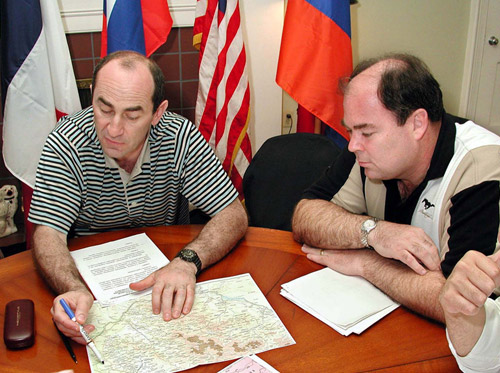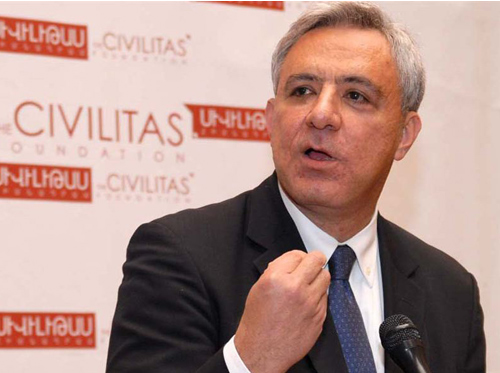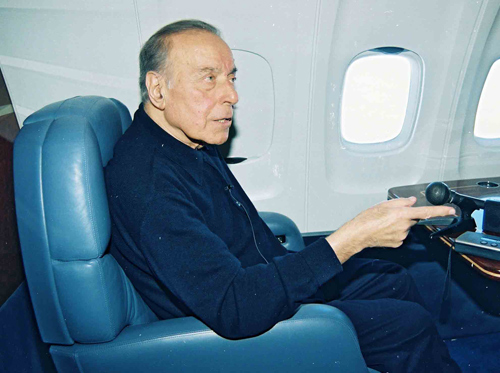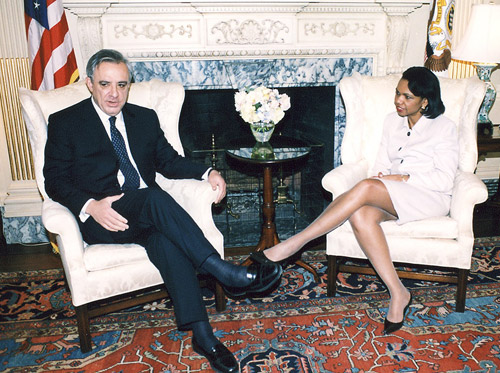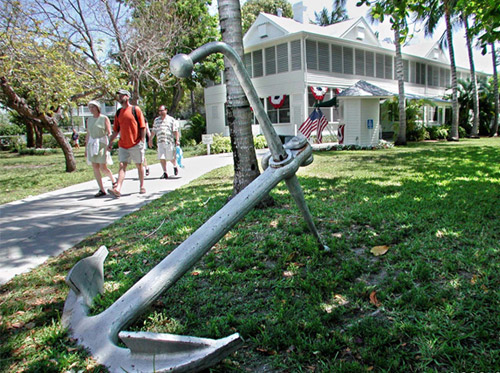Exclusive interview of former U.S. Co-Chair of the OSCE Minsk Group (1999-2001), Ambassador Carey Cavanaugh to Mediamax.
- 10 years have passed since the Key West talks, which, as many politicians and experts say, were the most real chance to reach a peace agreement. Being familiar with all nuances of processes going on at that time, do you agree with this opinion?
- Key West represented a unique point in efforts to resolve the stalemate over Nagorno-Karabakh and the results of the conflict.These peace talks grew out of the direct dialogue between Armenian President Robert Kocharian and Azerbaijan President Heydar Aliev that began in 1999. This represented a dramatic new phase in the effort to resolve the conflict as the presidents themselves developed an approach that they believed could bring about a definitive solution.
There was also recognition among the Minsk Group Co-chair states that the only way to achieve success was for all three to work toward a common end – the aim was not an agreement crafted or brokered by Moscow or Washington, but a solution that had been developed by Yerevan and Baku that had the full support of Moscow, Paris, and Washington. This new level of American-Russian-French cooperation to resolve the conflict was amazing, from top to bottom. All five parties worked together to support the process and advance a definitive solution.
Finally, there was no competing crisis on the international scene, making it possible to identify the significant financial resources that would be required to implement a solution. All of these factors combined at Key West to bring the parties to the edge of an agreement.
"Aliyev had restricted knowledge of the proposed solution to a very small circle, one that even excluded many of his key advisors"
- What became the main obstacle for reaching a breakthrough after the Key West talks - Heydar Aliyev’s poor health and inability to “sell” the deal at home, or something else?
- It must always be emphasized that peacemaking is hard. It demands commitment, strength, vision, and courage. It is no surprise that the Nobel Peace Prize is viewed as the world’s most prestigious recognition. Presidents Kocharian and Aliyev had both moved very far down the path to peace together, but in the end they were unable to seal the deal.
As I said in 2001, one major obstacle was the fact that neither side had done the necessary work to ready their populations for serious compromise. In private, both Presidents had come to this conclusion and were prepared to act. In public, however, they had conveyed no sign of this fact and, more often than not, continued to declare that all their demands must be met. In Azerbaijan, this was doubly difficult because Aliyev had restricted knowledge of the proposed solution to a very small circle, one that even excluded many of his key advisors. This demanded even greater political courage to act and accept a solution that was certain to elicit a strong public reaction.
Early on both presidents had acknowledged that the bold solutions under discussion could put their lives in jeopardy. The tragic October 27, 1999 assassinations at the Armenian Parliament reinforced that point vividly (the shootings also hurt the peace process with the loss of key figures such as Prime Minister Vazgen Sargsian and Speaker Karen Demirchian). That both leaders, despite this risk, earnestly continued to promote a firm solution underscored their commitment to building a better future for their countries.
Going into Key West, the Minsk Group Co-chairs understood that agreement was not a given. Indeed, no agreement would have been announced there (we were already planning for a politically neutral Geneva event) and we had taken steps to dampen expectations that a solution was imminent lest a collapse in the process lead to violence as had been seen with the inconclusive 2000 Israeli-Palestinian Peace Talks between Ehud Barak and Yasser Arafat at Camp David.
- Do you believe that Armenia was really going to implement the Paris and Key West agreements, or maybe Armenian President calculated that Heydar Aliev will do a setback and simply decided to appear constructive till Baku’s refusal?
- This question reflects more the situation that preceded 1999 and followed Key West than the atmosphere that was present at that period. I believe both Presidents were sincere in their desire to move forward with the solution that was being brokered. The process had gone far beyond simply scoring points by political maneuvering and had reached a common ground that had great promise. Each was willing to explore positions that they knew would be difficult, but that also were needed to bring about a definitive end to the conflict and put both countries and the region on the path to recovery and normal relations.
- From today’s viewpoint, when the Armenian and Azeri leaders meet once in several months and talk to each other for several hours only, the 5-day intensive talks in Key West seem to have been something unreal. Can you recall the atmosphere which reigned at Key West talks? Some people say that there was really good human contact between Robert Kocharian and Heydar Aliyev and they have truly respected each other. What was you impression?
- There was considerable mutual respect, but also a healthy caution that resulted from the long history of dashed efforts to advance a solution. There was a hard realism in their discussions that underscored the seriousness of the endeavor. They had met often and had worked hard together on advancing a solution. Out of the public glare, the mood was positive, but there were also frustrations given the difficulties of closing the final gap. Both were in evidence at private encounters, dinners, and on the sailboat cruise around the island.
- Thomas de Waal writes: “If Key West was Karabakh’s missed “Dayton moment,” the differences are instructive. To make the Dayton peace for Bosnia work, Richard Holbrooke had many instruments at his disposal which the Karabakh mediators do not”. Do you agree?
- Not really. At Dayton the parties came under intense pressure from the Contact Group to conclude an agreement. In the Minsk Group, it was always understood that a lasting Nagorno-Karabakh settlement could only be achieved if it was embraced by, not imposed upon, the parties to the conflict. Furthermore, one of the key instruments at Ambassador Holbrooke’s disposal was the threat of renewed use of force by NATO – a point driven home to Milošević daily as military aircraft took to the skies over Wright-Paterson Air Force Base. This too is an instrument that is not appropriate for the Minsk Group process. Quite the opposite, there is widespread belief that further military action in the region would make achieving any lasting solution more difficult. That is why so much attention is paid to even the smallest incidents and the loss of life along the line of contact.
Holbrooke believed that the selection of Dayton as the site for peace talks had contributed greatly to his negotiation effort. When I shared with him our plans for Key West he thought it was a perfect venue - a presidential setting (Truman’s ‘Little White House’), where talks could be effectively supported and the two leaders could meet comfortably, away from the influences of Washington and the press, for as long as necessary.
"Early on both presidents had acknowledged that the bold solutions under discussion could put their lives in jeopardy"
- There is an opinion that after the failure of the Key West U.S. became more reluctant and does not want to engage fully in the process as it was doing in 2001. What you think?
- From 1999 to 2001, there was tremendous engagement by the leadership of the three co-chair states to support the vision embraced by Presidents Kocharian and Aliyev. This included direct involvement by Russian President Vladimir Putin, French President Jacques Chirac, and US Presidents Bill Clinton and George W. Bush, as well as by their foreign policy teams. In fact, Nagorno-Karabakh was raised by Presidents Putin and Chirac in their telephone conversations with President Bush during his first week in office. When the April 2001 talks concluded, President Bush met separately with Presidents Kocharian and Aliyev in the Oval Office to review the results of the Key West and next steps.
Once it became clear after Key West that the needed groundwork had not been prepared, and that a near-term solution could not be achieved, it was natural that the attentions of these leaders would turn to other international concerns. I believe this reflected not so much a reluctance to engage as an acknowledgement that more work would need to be done in the region before progress could be achieved.
- Do you still follow the NK peace talks? Do you see any chance for a “new Key West” in the foreseeable future?
- I continue to follow developments in the region very closely. As director of the Patterson School of Diplomacy and a professor at the University of Kentucky, I am able to maintain contact with those in and out of government engaged in the peace process and to travel to the region - I was in Tbilisi in late October.
As for a “new Key West,” unfortunately despite years of effort on the Prague Process, the parties appear further from a settlement than they were in April 2001. Today, as then, there is little talk from the leadership of Armenia and Azerbaijan to their publics about the necessity of compromise and far too many statements – in particular from Baku – suggesting the possibility of military action.
I firmly believe that the only possible Nagorno-Karabakh solution is a political one that will require each side to give up something. What is under discussion now is not as bold as what was in play in 1999-2001, but perhaps that gives greater hope that the leadership of both countries will be able to come together in the common cause of peace.
Mediamax’s Aram Araratyan talked to Carey Cavanaugh.









